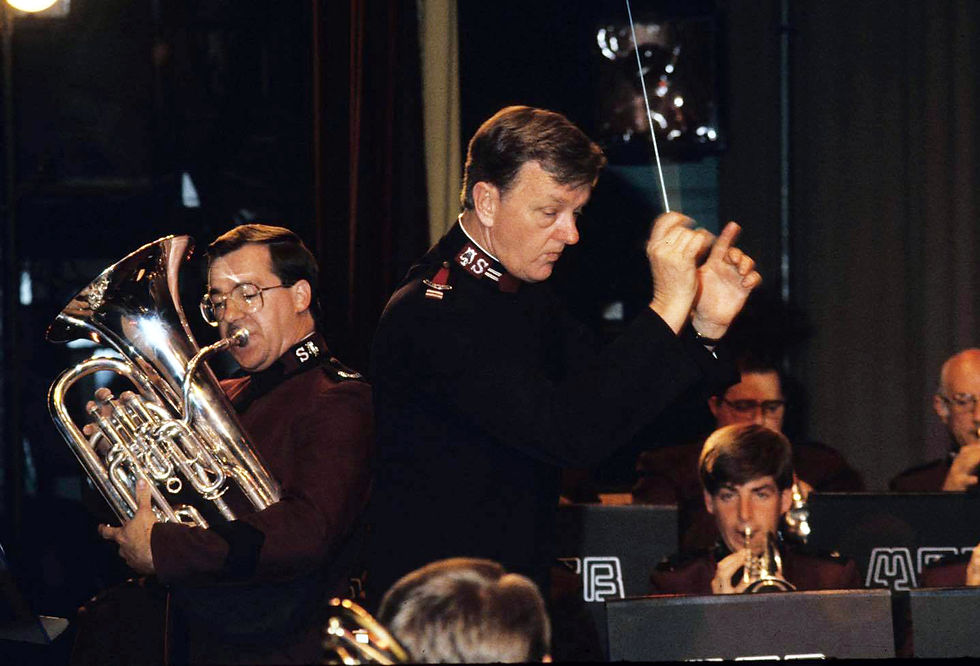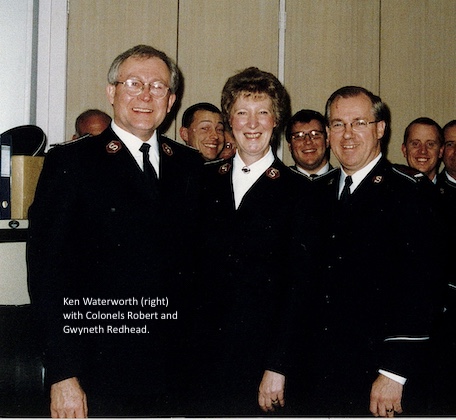From the top – Ken Waterworth’s 30 years as Staff Bandmaster

Ken Waterworth has been part of the Melbourne Staff Band since 1979, first playing euphonium and then taking over the baton as Staff Bandmaster in 1994. For almost three-quarters of his life, Ken has been a part of The Salvation Army’s premier brass band in Australia. He’s actually been hanging around the band since he was a boy in short pants, as his dad, Robin, was a long-term member.
Today (2 July) marks 30 years since Ken took up the MSB baton, passed on by Colin Woods, who led the MSB for 25 years from 1969. As the band’s leader, trainer and conductor, it is fair to say that Ken has taken the group and shaped it in an image of his choosing. Ken recently announced his retirement from the MSB role, which will take effect later this year. Salvos Online took the opportunity to speak to many of Ken’s peers about his significant contribution.
BY BARRY GITTINS
Ken Waterworth is respected by his international peers. Andrew Blyth rates the Australian Salvationist’s vision and commitment. He thinks Ken is “a man who understands the Holy Spirit in his life. As The Salvation Army has changed, Ken has adapted the band’s mission and continued to seek what God wants”.

Ken’s musicianship, innovation, use of multimedia and ability as a trainer are also mentioned by Bandmaster Stephen Cobb from the International Staff Band, who says, “Ken seems authentic, committed and determined.”
“Ken brought personality and significant musical ability to his role,” he adds. “He’s passionate about the Army and its mission, evidenced by how he lives, relates to others, how he makes decisions.”
For Commissioner Jim Knaggs, former Australian Southern Territorial Commander, Ken “is a solid man of God, honest in his approach and follow-through [who] uses music to communicate God’s unconditional love”.
“Sophisticated music is facing global disinterest,” Jim says, and Ken’s work “counters that issue, successfully and unapologetically”.
Respected Canadian Salvation Army composer Len Ballantine believes Ken “seeks conciliation and agreement in his dealings with people. He loves innovation, is self-disciplined, and he expects the same from others under his leadership. Ken is focused on his work, his family, and his faith [and] enjoys people”.
Monica Sakha, who saw Ken at work in the Kenya East Territory, believes his training and teaching to be unique. “All musicians desire that we could have him again for a music school/music camp,” she says, as his “passion and love for the young people and his session with bandmasters was of great value”. She added, “Ken is strict. He works hard. He is committed and enthusiastic. He expresses his faith by dedicating his time to music ministry.”
For Australian composer and arranger Roger Trigg, lately of Ireland, Ken’s constant encouragement and patronage have been a blessing. “Ken is determined and ambitious [with] an entrepreneurial spirit and an eye for detail,” Roger says. “He tries new things, and his teaching background perhaps gives him the tools to break down issues into smaller parts to effectively correct and improve the final result. He’s enabled the MSB to remain relevant and flexible.”
Ken himself acknowledges that his reputation as a band trainer of the highest calibre comes “from my teaching background in music education”, which, along with solid technique, has always “been a passion of mine; you teach from the podium”.

Ken in his own words
Asked if you must be a masochist to be a good bandmaster, Ken laughs, saying, “I’m very driven.”
“Brian Hogg made a comment in his notes for a piece he wrote, for myself and the band this year, suggesting I was someone who expected the very best of myself, and from those I work with … that echoes well with me.
“I want to use the gifts I have as well as I can. We’re all wired differently, but hopefully, the people I work and minister with can appreciate that.”
Leading the MSB is not an easy gig. Ken says he tries to maintain performance standards and keep the band relevant “by connecting with diverse people, professionals, performers and composers”.
“People management can be a challenge,” Ken says, adding he aspires to be “someone who people can share things with” and to “experience God, and share that experience”.
“I am not a shy person … I am comfortable being with people,” he says, adding, “I’m certainly not an extrovert. I am comfortable in my own skin. That is important in leadership; people have to see that you are confident. People will follow someone who is certain.”

Asked if he holds any regrets over how he has led the band for 30 years, Ken says, “With so much on my plate, I have wondered, ‘Could I have done better if I wasn’t juggling so many things?’
“Family, work, ministry; these have all been compromised a little to allow me to do the whole package. I look back and I believe I could have done things and handled things better if I’d had more time. But I did the best I could.
“The world has changed. Family and work commitments have had to be considered more. How many times have we sacrificed things for ministry?” Ken muses.
“Over the years, it’s our families that have been the ones who sacrificed for us so that we could enjoy the ministry that we do.”
Ken reflects on that sea change and thanks his wife, Lynne, and his family, as “it is a family commitment, not just my commitment”.
“When I became bandmaster, I had three young children, and another came along later. Lynne is the reason I’ve been able to do what I do. She didn’t grow up in The Salvation Army, so the ‘duty’ we undertake was not part of her experience or understanding of family life.”
The MSB is a sort of family or brotherhood in and of itself, with all the complications that families entail. Tales of band trips past are evergreen yarns: stories of errant gigs, jet lag, inspiring moments, memorable vocalists (for varying reasons), in-house gags and shared experiences that help groups bond.
Ken the leader
Several Melbourne peers helped Salvos Online understand Ken the leader.
Craig Downes admires Ken’s “sustained desire to keep going and maintain levels. There used to be brilliant players all over the band; Ken has a knack for getting players to play better. He is confident, determined, and positive.”
Mark Hamilton notes that “Ken is a good, acclaimed band trainer; hard-working, private, committed”, while Colonel Ian Hamilton states Ken “has immaculate deportment” and “is loyal and passionate”.

Brian Hogg recently wrote the piece ‘Nothing Less’ for Ken and the MSB, based on the hymn message, ‘My hope is built on nothing less than Jesus’ blood and righteousness’.
“Ken gives nothing less than his best and expects nothing but the best from other people,” Brian says. “He is a networker; dignified, self-confident and structured.”
Garry Todd praises Ken’s “consistency in preparation ... there’s never a time when Ken hasn’t been prepared; either that or he hides it well. He is focused and diligent”.
They say Ken tried to respond to the MSB’s challenges: rosters, relevance, repertoire and role.
“Maintaining personnel and standards of the MSB is hard, in terms of musical ability,” Craig says. “Ken being Ken, that would have been a big adjustment.”
Ian says Ken introduced the role of a female vocalist to the MSB as a musical innovation and a response to social change; Mark says the MSB’s adapting of multimedia was a crucial game-changer.

Ken and his audience
Noting that brass bands don’t have the same cultural connection enjoyed 50 years ago, Brian says Ken’s “always been prepared to try anything to help the band communicate with the audience”, including comic male voice numbers and ‘swing’ workshops.
Garry recognises early innovations, such as deploying a big band format and adding bass guitar and synthesiser to recording sessions.
It’s difficult to maintain a band’s enthusiasm. It’s hard to manage and lead people. It’s problematic striking a balance between preserving ‘old music’ and pushing the boundaries with new music.
Having the ‘cattle’ to achieve what you want is not a position that Ken has always been in, and life in 2024 – or our understanding of life – is radically different than in 1994.
“It must be tremendously frustrating for Ken now,” Garry says, “as the psyche of a bandsman has changed now, as have social and Salvation Army expectations. Families have been prioritised over the band; things are different now.”

Perhaps the MSB member closest to knowing and understanding their energetic, task-oriented bandmaster is his brother, Darren, who has been the Band Secretary throughout Ken’s tenure.
Ken is an encourager of youth, a protector of the MSB’s ‘brand’, a rejector of mediocrity, an innovator, and a student of other conductors, Darren says. Ken is a man who knows the “need to maintain quality in all aspects of the band’s ministry”.
Darren says then-Commissioner Eva Burrows once introduced the MSB and described the band’s mission as “the pursuit of excellence”.
“I think that could well sum up Ken’s approach,” Darren says, “and his commitment as bandmaster of the MSB.”
To view more photos of Ken Waterworth's tenure as MSB Bandmaster, click through the slideshow below:






















